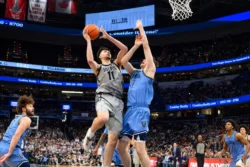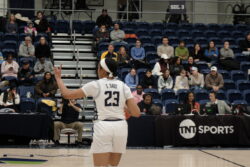“Execution” generally conjures up images of bloody necks outside the Tower of London. For Georgetown football, the word means winning a game—at least according to Coach Kevin Kelly, who attributed the team’s victory against the Bucknell Bison last Saturday to the fact that the team “executed better,” (in an entirely, non-homicidal kind of way). In the tradition of insightful sports sayings like, ‘sometimes you win, sometimes you lose, sometimes it rains,’ Kelly illuminated the key to Georgetown’s success by commenting, “We went down and scored on offense. On defense we stopped them.”
When asked to elaborate further on the key to the Hoyas’ success, Kelly held his cards close, “I don’t know if its one specific thing. It’s the execution part of it.”
Though one can never truly penetrate the mind of another human being—let alone a football coach—I might hazard a guess that Kelly is saying that the team knows their stuff, it’s just that, well, they choke. After weeks of losses (a couple humiliating) and an article published in the New York Times about the team’s struggles, the win against Bucknell was a rose in the briar patch, an oasis in the desert, a Columbus Day in the midst of midterms. All year, the Hoyas have shown glimmers of promise; clearly the Bucknell game was not a fluke; there is talent on the team. This observation makes the predicament of Hoya football a little more complicated: it’s not a physical thing, it’s mental. Uh-oh.
Maybe it’s all the youngsters on the squad, and maybe it comes down to simple feelings of abandonment by the university for the more glamorous basketball team, but something has been shaking the confidence of Kelly’s team. As the skipper himself put it, “When you’re not winning, you start to question what you’re doing.”
Is this just coach-speak for ‘the whole damn team is a bunch of head-cases’? If only it were that simple. In fact, the Hoyas may have just been mired in one sticky case of negative groupthink.
Groupthink is a theory of group dynamics identified by political scientist Irving Janis during the latter part of the 20th century. (We aim to entertain and educate). His theory concerned groups of powerful political actors, but powerfully built 18-22 year olds will have to do for this analogy. Basically, the theorist said that groups under great stress begin to rationalize bad decisions and not express their true feelings. They start to think alike. In the case of Georgetown football, thinking alike meant thinking the next game would be a loss—and the next and the next and the next.
Perhaps what the team needs is one good counseling session, or group-hypnosis with a sports therapist. Perhaps Pilates, yoga or medicinal peyote are in order so that the boys can reach new levels of consciousness and discover the connection between body and spirit.
Or perhaps they should just put on their pads and execute.





